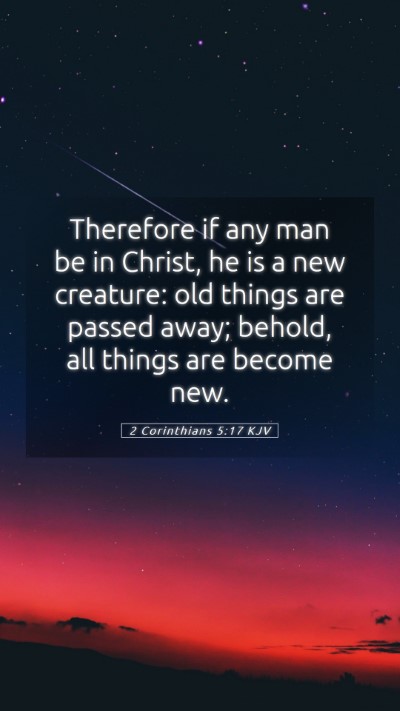Understanding 2 Corinthians 5:17
Bible Verse: “Therefore if any man be in Christ, he is a new creature: old things are passed away; behold, all things are become new.” (2 Corinthians 5:17)
Bible Verse Meaning
This verse is a profound statement of transformation and renewal that occurs when one becomes a follower of Christ. The Apostle Paul emphasizes that being "in Christ" denotes a radical change in a person's life and identity.
Commentary Insights
-
Matthew Henry: He points out the significance of the term "new creature." This reflects not merely a change in behavior but a fundamental transformation of nature, implying a person’s previous life is left behind and replaced by a new divine nature.
-
Albert Barnes: He emphasizes the assurance provided in this transformation. The term "old things are passed away" indicates that past sins and failures are obliterated; they have no bearing on one’s present or future identity in Christ.
-
Adam Clarke: Clarke discusses the implications of being a "new creature," noting that this brings with it new affections, new pursuits, and a completely new outlook on life. It speaks to the believer’s new relationship with God, where all things reflect their new identity.
In-Depth Analysis
To fully understand the implications of 2 Corinthians 5:17, one must consider the context of the passage and the life-changing power of Christ.
Historical Context
The Apostle Paul wrote this letter to the Corinthians, addressing issues within the church and reaffirming his apostolic authority. The Corinthian believers were experiencing various challenges in their faith, often influenced by the surrounding culture. This verse serves as a reminder of their new identity amidst those struggles.
Transformation through Christ
Becoming "in Christ" means an individual experiences a complete metamorphosis — a total renewal of heart, mind, and spirit, which is fundamental to the Christian faith. This transformation implies:
- The end of the former way of living (old things passed away).
- The beginning of a new life characterized by righteousness and intimacy with God (all things are become new).
Application to Daily Life
For believers, applying the truth of 2 Corinthians 5:17 involves recognizing that their past does not define them. They should:
- Embrace their new identity in Christ, knowing they are freed from sin.
- Strive to live out the newness of life in practical ways every day.
- Encourage others in their studies and growth in faith through various Bible study resources and Bible study guides.
Cross References
This transformative message of 2 Corinthians 5:17 has connections with several other scriptures that reflect the themes of renewal and new identity:
- Galatians 2:20: "I am crucified with Christ: nevertheless I live; yet not I, but Christ liveth in me." This verse highlights the believer's union with Christ in death and resurrected life.
- Ephesians 2:1-10: Understanding the transition from being dead in sin to being made alive in Christ.
- Romans 6:4: Discusses walking in newness of life as a result of being buried with Christ in baptism.
Conclusion
2 Corinthians 5:17 encapsulates the heart of the Gospel's message: that through Christ, we are transformed and renewed, becoming new creations. This understanding not only offers hope for eternal life but also empowers us to live victoriously in our day-to-day lives.
For those seeking Bible verse meanings, the essence of this verse lies in the affirmation that our past does not influence our present or future when we are in Christ. By grasping this transformation, believers can navigate life's difficulties with renewed faith and purpose.


